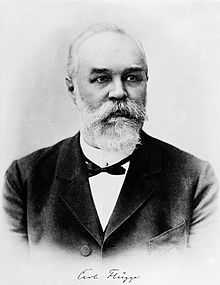Carl Flügge

Carl Georg Friedrich Wilhelm Flügge (12 September 1847 – 10 December 1923) was a German bacteriologist and hygienist.
Biography
He was a native of Hanover. He studied medicine in Göttingen, Bonn, Leipzig and Munich, and in 1878 was a lecturer of hygiene in Berlin. In 1881 he became the first chair of hygiene at the University of Göttingen, and afterwards a professor at the Universities of Breslau and Berlin, where he succeeded Max Rubner (1854–1932) at the Department of Hygiene. Flügge was a colleague of microbiologist Robert Koch (1843–1910), with whom he co-edited the journal Zeitschrift für Hygiene und Infektionskrankheiten.[1] Two of his better-known assistants at Breslau were Wolfgang Weichardt (1875–1943) and Walther Kruse (1864–1943).
Work
Carl Flügge was known for advocating hygiene as an independent medical discipline, and is remembered for performing extensive research involving the transmission of infectious diseases such as malaria, tuberculosis and cholera. In the 1890s he demonstrated that even during "quiet speech", minute droplets (Flügge droplets) are sprayed in the air. This finding was instrumental in Jan Mikulicz-Radecki's (1850–1905) advocacy of surgical gauze masks in 1897.
Publications
Among his publications are two important works on hygiene:
- Lehrbuch der hygienischen Untersuchungsmethoden; (“Textbook of hygienic investigation methods”).
- Grundriss der Hygiene; (“Outline of hygiene”, new edition 1902).
Other works include:
- Beiträge zur Hygiene; (“Contributions to hygiene”, 1872).
- Die Mikroorganismen; (“Microorganisms”, third edition 1896).
References
- ↑ Mazumdar, Pauline M. H. (18 July 2002). Species and Specificity: An Interpretation of the History of Immunology. Cambridge University Press. pp. 83–. ISBN 978-0-521-52523-7.
Bibliography
| Wikimedia Commons has media related to Karl Flügge. |
- Textbook of hygienic investigation methods (translated from German)
- The Gospel of Germs: Men, Women, and the Microbe in American Life
- Charles M. Poser, G. W. Bruyn (1999). An illustrated history of malaria. Informa Health Care. p. 39. ISBN 1-85070-068-0.
-
 Rines, George Edwin, ed. (1920). "Flügge, Karl". Encyclopedia Americana.
Rines, George Edwin, ed. (1920). "Flügge, Karl". Encyclopedia Americana.
|